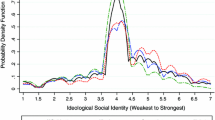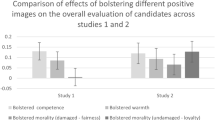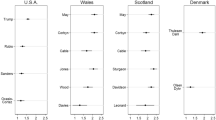Abstract
The main aim of this work is to present a new method of political evaluations that is grounded in Tversky’s contrast theory of similarity. The current study tested how comparisons to an ideal or anti-ideal politician moderated the evaluation of candidates whose images were defined by the strength and structure of positive and negative associations. Our study accounts for two key aspects of political behavior: the dependence on the point of reference and the associative structure of candidate image. Our approach was tested in the context of the 2016 US presidential elections, where Hilary Clinton and Donald Trump ran for the Presidential office. Although the study was conducted almost three years after the elections, its results still resembled the electoral behavior during the presidential campaign. The findings showed no differences between two politicians with regard to their similarity to an anti-ideal politician, however, they differed when compared to an ideal politician, with Clinton having more commonality with the ideal politician. Moreover, the activated category (ideal/ anti-ideal) moderated the evaluation of two opposing politicians. The results are discussed within the contrast model of similarity, pointing to the validity of our approach when used to analyze behavior in a political context.



Similar content being viewed by others
Notes
-
An open set is defined as a set where number of features does not need to be constant. A city is an example of an open set of features as previously non-existing elements can appear due to development (e.g., subway, parking lots) (see Falkowski et al., 2018).
-
Correlations between affect and behavior (intention to vote) for both Hilary Clinton and Donald Trump in both framings: ideal and anti-ideal (r(37) = .88, p < .001; r(37) = .94, p < .001; r(27) = .93, p < .001; r(27) = .95, p < .001 respectively).
References
APA (2017). Ethical Principles of Psychologists and Code of Conduct. Including 2010 and 2016 Amendments. http://www.apa.org/ethics/code/.
Baumeister, R. F., Bratslavsky, E., Finkenauer, C., & Vohs, K. D. (2001). Bad is stronger than good. Review of General Psychology, 5(4), 323–370. https://doi.org/10.1037/1089-2680.5.4.323.
Bizer, G. Y., Larsen, J. T., & Petty, R. E. (2011). Exploring the valence-framing effect: Negative framing enhances attitude strength. Political Psychology, 32, 59–80. https://doi.org/10.1111/j.1467-9221.2010.00795.x.
Chong, D., & Druckman, J. N. (2007). Framing public opinion in competitive democracies. American Political Science Review, 101(4), 637–655. https://doi.org/10.1017/S0003055407070554.
Cobb, M. D., & Kuklinski, J. H. (1997). Changing minds: Political arguments and political persuasion. American Journal of Political Science, 41(1), 88–121.
Cwalina, W., & Falkowski, A. (2015). Political branding: Political candidates positioning based on inter-object associative affinity index. Journal of Political Marketing, 14, 152–174. https://doi.org/10.1080/15377857.2014.990842.
Cwalina, W., Falkowski, S., & Kaid, L. L. (2000). Role of advertising in forming the image of politicians: Comparative analysis of Poland, France and Germany. Media Psychology, 2, 119–146. https://doi.org/10.1207/S1532785XMEP0202_2.
Cwalina, W., Falkowski, A., & Newman, B. I. (2011). Political Marketing: Theoretical and Strategic Foundations. M.E. Sharpe, Inc.
de Vreese, C. H. (2005). News framing: Theory and typology. Information Design Journal + Document Design, 13(1), 51–62. https://doi.org/10.1075/idjdd.13.1.06vre.
Doherty, B. J. (2012). The rise of the President's permanent campaign. University Press of Kansas.
Druckman, J. N. (2001). On the limits of framing effects: Who can frame? Journal of Politics, 63(4), 1041–1066. https://doi.org/10.1111/0022-3816.00100.
Edsall, T. B. (2016). How many people support trump but Don’t want to admit it? The New York Times. https://www.nytimes.com/2016/05/11/opinion/campaign-stops/how-many-people-support-trump-but-dont-want-to-admit-it.html
Entman, R. M. (2007). Framing bias: Media in the distribution of power. Journal of Communication, 57(1), 163–173. https://doi.org/10.1111/j.1460-2466.2006.00336.x.
Falkowski, A., Sidoruk-Błach, M., Bartosiewicz, Z., & Olszewska, J. M. (2018). Asymmetry in similarity formation: Extension of similarity theory to open sets of features. American Journal of Psychology, 131(2), 151–159. https://doi.org/10.5406/amerjpsyc.131.2.0151.
Falkowski, A., Sidoruk, M., Olszewska, M., & Jablonska, M. (2021). Positive-negative asymmetry in evaluation of natural stimuli: Empirical study in the contrast model of similarity extended to open sets. American Journal of Psychology, 134(1), 1–11. https://doi.org/10.5406/amerjpsyc.134.1.0001.
Five Thirty-Eight, 2016: Who will win the presidency? https://projects.fivethirtyeight.com/2016-election-forecast/
Hallahan, K. (1999). Seven models of framing: Implications for public relations. Journal of Public Relations Research, 11(3), 205–242. https://doi.org/10.1207/s1532754xjprr1103_02.
Kahneman, D. (2012). Thinking fast and slow. Farrar, Straus and Giroux.
Kahneman, D., & Tversky, A. (1984). Choices, values, and frames. American Psychologist, 39, 341–350.
Kaid, L. L., & Holtz-Bacha, C. (2006). The sage handbook of political advertising (pp. 325–342). Sage Publications.
Keller, K. L. (2013). Strategic Brand Management. Building, measuring and managing brand equity. Prentice Hall.
Kinder, D. R., Peters, M. D., Abelson, R. P., & Fiske, S. T. (1980). Presidential prototypes. Political Behavior, 2, 315–337. https://doi.org/10.1007/BF00990172.
Klein, J. B., & Ahluwalia, R. (2005). Negativity in the evaluation of political candidates. Journal of Marketing, 69, 131–142. https://doi.org/10.1509/jmkg.69.1.131.55509.
Kleine, R. E., & Kernan, J. B. (1988). Measuring the meaning of consumption object’s: An empirical investigation. Advances in Consumer Research, 15, 498–504.
Kleine, R. E., & Kernan, J. B. (1991). Contextual influences on the meanings ascribed to ordinary consumption objects. Journal of Consumer Research, 18, 311–324. https://doi.org/10.1086/209262.
Lau, R. R., Sigelman, L., & Rovner, I. B. (2007). The effects of negative political campaigns: A meta-analytic reassessment. The Journal of Politics, 69, 1176–1209. https://doi.org/10.1111/j.1468-2508.2007.00618.x.
Minsky, M. (1975). A framework for representing knowledge. In P. H. Winston & B. Horn (Eds.), The psychology of computer vision (pp. 211–277). McGraw-Hill.
Morris, J. D., Woo, C., Geason, J. A., & Kim, J. (2002). The power of affect: Predicting intention. Journal of Advertising Research, 42, 7–17. https://doi.org/10.2501/JAR-42-3-7-17.
Needham, C., & Smith, G. (2015). Introduction: Political branding. Journal of Political Marketing, 14, 1–6. https://doi.org/10.1080/15377857.2014.990828.
Nelson, T. E., Oxley, Z. M., & Clawson, R. A. (1997). Toward a psychology of framing effects. Political Behavior, 19(3), 221–246. https://doi.org/10.1023/A:1024834831093.
Pich, C., & Newman, B. I. (2020). Evolution of political branding: Typologies, diverse settings and future research. Journal of Political Marketing, 19, 3–14. https://doi.org/10.1080/15377857.2019.1680932.
Sujan, M., Bettman, J. R., & Baumgartner, H. (1993). Influencing consumer judgments using autobiographical memories. Journal of Marketing Research, 30, 422–436. https://doi.org/10.2307/3172688.
Szalay, L. B., & Deese, J. (1978). Subjective meaning and culture: An assessment through word associations. Lawrence Erlbaum Associates.
Tedesco, J. C., & Dunn, S. W. (2018). Political advertising in the 2016 U.S. presidential election: Ad hominem ad nauseam. American Behavioral Scientist, 63, 935–947. https://doi.org/10.1177/0002764218756919.
Tversky, A. (1977). Features of similarity. Psychological Review, 84(4), 327–352. https://doi.org/10.1037/0033-295X.84.4.327.
Tversky, A., & Kahneman, D. (1986). Rational choice and the framing of decisions. The Journal of Business, 59, S251–S278.
Wilke, W. L. (1994). Consumer behavior. Wiley.
Author information
Authors and Affiliations
Corresponding author
Ethics declarations
Ethical Statement
All procedures performed in the study involving human participants were in accordance with the ethical standards of the institutional and/or national research committee and with the 1964 Helsinki declaration and its later amendments or comparable ethical standards. The study was approved by the authors’ university Institutional Review Board at the University of Wisconsin Oshkosh, USA. The manuscript is based on original research and has not been previously published elsewhere and it has not been submitted simultaneously for publication elsewhere. We confirm that all of the research meets the ethical guidelines in the treatment of participants, informed consent was granted by the participants and that they were debriefed.
Declarations of Conflict of Interest
None
Additional information
Publisher’s Note
Springer Nature remains neutral with regard to jurisdictional claims in published maps and institutional affiliations.
Appendix 1
Appendix 1
An example of the thirty most representative features for four politicians (Hilary Clinton, Donald Trump, Ideal Politician (I. Politician) and Anti-ideal Politician (AI. Politician) together with their dominance scores (ds).
Hilary Clinton |
Trump |
I. Politician |
AI. Politician |
||||
Feature |
ds |
Feature |
ds |
Feature |
ds |
Feature |
ds |
intelligent |
39 |
selfish |
24 |
intelligent |
57 |
racist |
27 |
liar |
31 |
mean |
24 |
honest |
47 |
liar |
26 |
experienced |
22 |
unintelligent |
20 |
caring |
40 |
untrustworthy |
21 |
qualified |
20 |
disgusting |
20 |
smart |
31 |
greedy |
21 |
strong |
19 |
unqualified |
19 |
compassionate |
29 |
rude |
20 |
smart |
17 |
racist |
18 |
strong |
26 |
ignorant |
18 |
caring |
15 |
egotistical |
18 |
hardworking |
26 |
uneducated |
16 |
democrat |
13 |
ignorant |
15 |
wise |
24 |
stupid |
14 |
competent |
11 |
ugly |
14 |
experienced |
24 |
conservative |
14 |
calculated |
11 |
narcissist |
14 |
helpful |
19 |
thief |
13 |
hard working |
10 |
liar |
14 |
trustworthy |
19 |
bigoted |
12 |
old |
10 |
rude |
13 |
fair |
18 |
cheater |
12 |
capable |
9 |
trustworthy |
12 |
truthful |
17 |
dishonest |
12 |
compassionate |
9 |
stupid |
12 |
empathetic |
15 |
dangerous |
11 |
thoughtful |
9 |
inexperienced |
12 |
compromising |
14 |
arrogant |
11 |
evil |
9 |
evil |
12 |
diplomatic |
13 |
fake |
11 |
kind |
8 |
corrupt |
12 |
selfless |
13 |
corrupt |
10 |
untrustworthy |
8 |
child like |
12 |
charismatic |
13 |
mean |
10 |
criminal |
8 |
sociopath |
11 |
good leader |
12 |
irresponsible |
9 |
fierce |
8 |
he thinks different |
11 |
humble |
11 |
dumb |
9 |
mean |
8 |
uneducated |
10 |
reliable |
11 |
traitor |
9 |
responsible |
8 |
gross |
10 |
capable |
11 |
disgusting |
9 |
fake |
8 |
terrible |
9 |
inspiring |
10 |
selfish |
9 |
insider |
8 |
reckless |
9 |
kind |
10 |
narcissistic |
9 |
wise |
7 |
orange |
9 |
educated |
9 |
evil |
8 |
knowledgeable |
7 |
opinionated |
9 |
competent |
9 |
extreme |
8 |
sneaky |
7 |
Idiotic |
9 |
for the people |
9 |
bully |
8 |
selfish |
7 |
hateful |
9 |
bold |
9 |
lazy |
7 |
cold |
7 |
uncompromising |
8 |
knowledgeable |
9 |
cruel |
7 |
rude |
7 |
strong |
8 |
responsible |
9 |
stubborn |
7 |
… |
… |
…. |
… |
… |
… |
… |
|
Total: |
912 |
Total: |
1030 |
Total: |
1019 |
Total: |
601 |
Rights and permissions
About this article
Cite this article
Olszewska, J.M., Falkowski, A., Conway, S.P. et al. Ideal and anti-ideal as framing in political evaluations. Psychological analysis of political candidates in the theory of similarity. Curr Psychol 42, 8313–8326 (2023). https://doi.org/10.1007/s12144-021-02168-7
Accepted:
Published:
Issue Date:
DOI: https://doi.org/10.1007/s12144-021-02168-7




